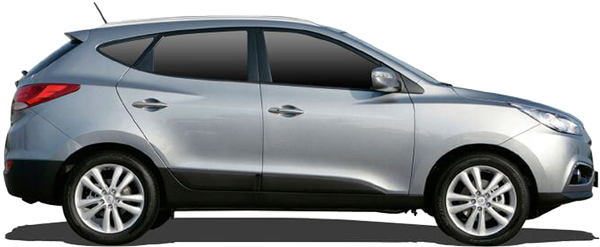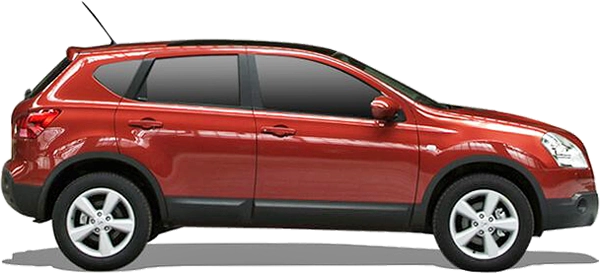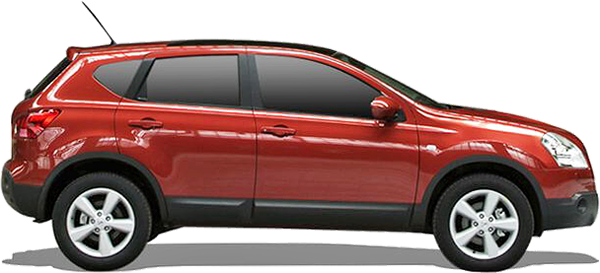The Comparative Analysis :
Hyundai ix35 Fuel Cell (15 - 18) vs. Nissan Qashqai+2 1.6 dCi 4x4 (11 - 14)
€ 65,500

€ 30,300

€ 65,500
Base Price ⓘBase price of a new vehicle with standard equipment in Germany at market launch.
€ 30,300
ⓘBase price of a new vehicle with standard equipment in Germany at market launch. Price Info
Vehicle Dimensions
The dimensions of these vehicles differ slightly. The Hyundai ix35 Fuel Cell is 13.1 cm shorter, 4 cm wider and 1 cm taller than the Nissan Qashqai+2 1.6 dCi.
Hyundai ix35 Fuel Cell
Nissan Qashqai+2 1.6 dCi
1655
1820
2100
1645
1780
1980
1820 mm
Width
1780 mm
2100 mm
Width Incl. Mirrors
1980 mm
1655 mm
Height
1645 mm
2640
4410
2765
4541
4410 mm
Length
4541 mm
2640 mm
Wheelbase
2765 mm
Vehicle Weight
Hyundai ix35 Fuel Cell
Nissan Qashqai+2 1.6 dCi
1921 kg
Kerb Weight
1640 kg
2250 kg
Gross Vehicle
Weight
Weight
2320 kg

Weight Difference:
281 kg
14.63 %

General
Hyundai ix35 Fuel Cell
Nissan Qashqai+2 1.6 dCi
EL
Generation
J10
Sport Utility Vehicle
Car Body Style
Sport Utility Vehicle
Hydrogen
Fuel Type
Diesel

Front-wheel drive
Drive
Permanent all-wheel drive

1-speed automatic transmission
Transmission
6-speed manual transmission
Engine
Hyundai ix35 Fuel Cell
Nissan Qashqai+2 1.6 dCi
Asynchronous motor
Engine Type
Straight-four diesel engine with turbocharger
0
Valves
4
0
Cylinders
4
0 CC
Engine Capacity
1598 CC
134 bhp
at 0 rpm
Power
128 bhp
at 4000 rpm
Hyundai ix35 Fuel Cell
134 bhp
128 bhp
Nissan Qashqai+2 1.6 dCi
300 NM
at 0 rpm
Max. Torque
320 NM
at 1750 rpm
Hyundai ix35 Fuel Cell
300 NM
320 NM
Nissan Qashqai+2 1.6 dCi
Performance
Hyundai ix35 Fuel Cell
Nissan Qashqai+2 1.6 dCi
99 mph
Maximum Speed
117 mph
12.5 sec
Acceleration 0 to 62 mph
11.6 sec
62 mph
62
mph
mph
174 m
0.000 sec

Hyundai ix35 Fuel Cell
62 mph
62
mph
mph
161 m
0.000 sec

Nissan Qashqai+2 1.6 dCi
▶ REPLAY
14.34 kg/bhp
Weight-to-Power Ratio
12.81 kg/bhp
Hyundai ix35 Fuel Cell
14.34 kg/bhp
12.81 kg/bhp
Nissan Qashqai+2 1.6 dCi
Fuel Economy / Emissions
Hyundai ix35 Fuel Cell
Nissan Qashqai+2 1.6 dCi
Fuel Economy
1.6 kg H2✽
( 75 MPGe ⓘ Miles per gallon petrol equivalent (MPGe) is a measure of the average distance traveled per unit of energy consumed. MPGe, specified in miles per imperial gallon (~4.546 litres), is used to compare the energy consumption of vehicles that use different energy sources.)
combined ✽ per 100 miles
53 mpg
( 60 MPGe ⓘ Miles per gallon petrol equivalent (MPGe) is a measure of the average distance traveled per unit of energy consumed. MPGe, specified in miles per imperial gallon (~4.546 litres), is used to compare the energy consumption of vehicles that use different energy sources.)
Hyundai ix35 Fuel Cell
75 MPGe
60 MPGe
Nissan Qashqai+2 1.6 dCi
1.4 kg H2
city
46 mpg
1.6 kg H2
motorway
60 mpg
5.6 kg
Fuel Tank Capacity
65 L
348 mi
Range
762 mi
Hyundai ix35 Fuel Cell
348 mi
762 mi
Nissan Qashqai+2 1.6 dCi
Environmental Impact
131.5 kWh
Total Energy Consumption
per 100 miles ⓘThe total energy consumption per 100 miles is the amount of energy consumed by a vehicle when burning fuel or using electricity per 100 miles (final energy), and the energy required to produce the appropriate amount of fuel or electricity (primary energy).
per 100 miles ⓘThe total energy consumption per 100 miles is the amount of energy consumed by a vehicle when burning fuel or using electricity per 100 miles (final energy), and the energy required to produce the appropriate amount of fuel or electricity (primary energy).
109.1 kWh
Hyundai ix35 Fuel Cell
131.5 kWh
109.1 kWh
Nissan Qashqai+2 1.6 dCi
Brennstoffzelle (Wasserstoff)
Emission Standard
Euro 5
0 g/km (NEFZ)
CO2 Emissions
139 g/km (NEFZ)
Practical Convenience
Hyundai ix35 Fuel Cell
Nissan Qashqai+2 1.6 dCi
5
Doors
5
5
No. of Seats
7
329 kg
Maximum Payload
680 kg
591 L
Boot Capacity
130 L







1436 L
Boot Capacity (Seats Down)
1520 L















